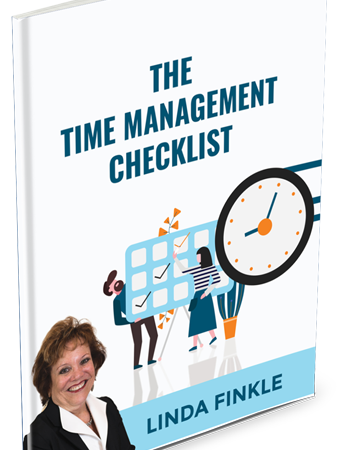Time management is a fallacy. You can’t manage time and we are all bound by 24 hours in a day and 7 days a week. We can however adopt new behaviors and thinking that will improve your performance, help you become more efficient and ease stress.
Here are fifteen ideas that will help.
- 1. Plan but be flexible.
You have to be flexible or you’ll find yourself stressed out attempting to follow a plan that is unrealistic.
Do not let your plan rule your life. It’s more than a guide, but less than something carved in stone. Situations pop up you could not have planned for, or been aware of when planning
- 2. Accept that planning isn’t a science.
Statistically you will always plan more than is possible for any human being, regardless of how well you plan. Everything takes longer than we estimate. If your day has six tasks on it and you’ve calculated this is eight hours of work you will be behind before the day starts.
These six tasks are likely to take you closer to 12 hours than 8, even without interruptions or something unexpected.
Want to find out if I’m correct? Write down a list of everything you plan on doing during the day, at work. Beside each task record how much time you estimate it will take, even if it’s only 5 or 10 minutes. Once you complete the task record the actual time it took. See where you are at the end of the day.
- 3. Focus on results, not hours.
What’s important is what you accomplish, not how many hours you work. Two things to remember:
- – Your mind gets tired and when you are tired you aren’t as productive or creative.
- – You aren’t being paid for your time, you are being paid for results. Whether you are an employee, self-employed or a consultant those you work for want results, and that’s how you are measured.
- 4. Ask yourself these key questions.
- – Why am I doing this? What’s the motivation?
- – Is there a simpler way to accomplish this task, activity or goal?
- – Is there someone else who can, and should be handling this?
When you answer these questions you are likely to determine you are doing things that are unnecessary, should be delegated or there is an easier way to accomplish.
- 5. Organize and declutter.
Disorganization costs us time. How often have you looked for a document or an email that you misfiled or didn’t take the time to file at all? How much time did you waste? This doesn’t even account for time we waste returning to our office before a meeting for that forgotten item, too many meetings back-to-back without time to think, clear your head or even go to the bathroom.
Clutter is energetically draining, besides time wasting. Get rid of those publications (physical or digital) that have piled up. Clean out your inbox. Handle what needs attention, delete what you can, mark what is necessary to come back to and the rest…move to a folder or some way to manage it. It’s depressing to see 5000 emails in your inbox. Unsubscribe to newsletters you haven’t read in months. Finally clean up your physical space. Trash, file, organize, hand off to someone else…whatever you can do to clear up your physical space is important for both your mental health and organization.
- 6. Set deadlines, even if artificial.
Many things I do for my business don’t have a deadline, except of course client work. The problem with having no formal deadlines is as you can imagine, things don’t get done in a timely manner.
I’ve learned over the years to set deadlines, even if they are artificial, meaning that they impact no one but me and the team. They do however keep us focused and moving forward, and provide a way for us to measure progress (or lack thereof) and get us back on course when we wander.
- 7. Chunk out tasks.
Every project has multiple phases or steps. Take the time to create a list of those phases, so you can chunk out time for them. It also helps ensure you don’t miss something.
When we do a product launch we know what needs done. Copy needs written, emails created, advertising created and tested, the product itself needs developed, promotional information needs developed, everything needs to be put on the website and our shopping cart and the list goes on. Even if I personally am not responsible for most of it, having a list of what needs done, who is responsible and time lines helps me know what I need to build into my own schedule that is my responsibility, and identifying time to handle.
It also helps me assess how much time I need as one part may take me an hour and other parts many hours.
- 8. Keep a list of tolerations, and handle.
We all have them…those annoying things we keep reminding ourselves we need to handle but don’t get to. My list is personal and professional, broken down by each.
It includes everything from scheduling my car for service, to getting stamps before I run out to ordering light bulbs in a size I don’t have to learning how to use LinkedIn more effectively and everything in between. Some are literally 5 minute to dos, that I simply keep forgetting about (except during a meeting or on my way somewhere), but some are bigger and need my attention and space in my calendar.
Writing them down helps you take away the stress of keeping them in your head. And when you have 10 minutes before a meeting for instance you can look at the list and see what you can tackle.
- 9. Finish what you started before going on.
I am easily distracted and could be writing this article and then stop to check email and respond to an email, which takes me somewhere else and it’s tomorrow before I get back to the article. I lose focus, I forget what brilliant idea I wanted to share, it wastes time, AND it all could have waited another 15 or 20 minutes till I finished the article.
Whatever you are working on, finish it before moving on.
- 10. Change your body disposition.
Sitting for long periods of time isn’t healthy for your body, but it’s also not healthy for your mind. Get up and walk around a bit every hour or so. Stand when you can and work. When I am on the phone I travel…meaning I walk around my office. My fitbit loves me and my mind is clearer.
Changing your body disposition helps improve your creative thinking, gets you refocused and will shift your thinking and attitude.
- 11. Plan time to do nothing.
Include time in your week to do nothing. This is when you sit back and think, assess, can be creative, have the opportunity to see solutions to situations you can’t see when you are in the middle of them, to take stock and evaluate. When you are in the doing mode you can’t see beyond that.
You’ve probably heard people say they do their best thinking in the shower or some other time they aren’t focused on anything. Planning in time to just think, where you aren’t having to do something will impact in a positive way your productivity.
- 12. Work around your biorhythms.
I’m a morning person and am raring to go at 7 AM. I tackle what I can before 1 or 2 PM because after 3 I’m not at my best. I function yes, but I’m not at my peak.
You may not get your first burst of real energy till noon. What matters is learning and recognizing when you are at your best and plan whenever possible to do the hard work when you are at your peak.
- 13. Take breaks.
Take time for lunch, and I don’t mean eating at your desk while working. Step outside and take a walk, eat your lunch someplace besides your office…get away from your desk. When you work from home this is critical, perhaps even more so because it’s so easy to just keep working.
Set a timer if you need to for lunch break, and take it. When you get up for water or coffee take a few extra minutes and relax or have a healthy snack. If you’re home, pet the dog, play with the kids for a few minutes, walk outside and smell the flowers and listen to the birds…something besides running right back to your desk.
- 14. Take care of yourself.
Here are a few things to consider:
- – Eat healthy, get the proper amount of sleep, get physical activity…all those things you already know but probably aren’t doing.
- – Step away from work and focus on something you enjoy. Work will always be there. Spend time on a hobby you love, playing with the kids, reading a book you want, attacking the home project and yes even a couple of those pesky items on your tolerations list.
- – Learn to let go. It’s the boundaries you set (leaving work instead of working day and night) but also letting go of the guilt that you should be able to do more, accomplish more and be more productive.
- 15. Celebrate.
We don’t celebrate enough. What I hear so often from clients and others is how much is left to do, how far they still have to go, what’s not working…instead of how far they have come, what success they have had and what is working.
Take the time to celebrate and be happy at what you have been able to accomplish. You’ll be amazed at how much more you accomplish when you feel positive.
I wish I could help you stretch your 24 hours into 30 or 35, or add another day to the week. But even if I could you, like the rest of us would be looking to add more hours in the day and days in the week anyhow. So while I can’t give you more time I can help you refocus the time you have and use it more productively.









